BFUWI Diabetes and Caribbean Folklore June 2013
Diabetes Lecture went down a ‘sweet’ treat
In more Caribbean news, on Thursday 20th June 2013, the well loved Prof. Dalip Ragoobirsingh delivered a compelling lecture / discussion on diabetes at the Trinidad and Tobago High Commission.
Prof. Dalip Ragoobirsingh who is famed throughout the Diabetes Community in the Caribbean for being down to earth and for having founded many Diabetes specific clinics in the region, was a hit with the packed audience of primarily Caribbean nationals.
Organised by the British Foundation for the University of the West Indies and assisted by CaribDirect Multi-Media Limited the event the main aspects of the lecture included:
- The prevalence of Type 2 Diabetes Mellitus
- Obesity and our cultural practices/ folklore beliefs
- Relationship between Obesity & Diabetes Mellitus
- Management of Diabetes and impact of unorthodox treatments
- Complications – increased risk to coronary heart disease, stroke & hypertension.
- Health Tips on nutrition, foot-care, self-management
- Strategies of Caribbean governments in combating this scourge of Diabetes & its complications.
Professor Dalip Ragoobirsingh who is Professor of Medical Biochemistry, Director- Diabetes Education Programme, Faculty of Medical Sciences University of the West Indies (UWI), Mona Campus, Jamaica delivered what many expected to be boring and filled with medical jargon, in a manner that evoked the odd chuckle and occasional laugh.
So instructive and compelling was his presentation that it prompted a vigorous question and answer session that could have gone on till the next morning!
The professor’s revelations about the medicinal value (or lack thereof) of some folk remedies astounded many and in some quarters met with resistance. Nonetheless much was learnt and guests spent the remaining evening discussing the new information and comparing notes on their knowledge and experience of the disease, diabetics, traditional treatments, case studies and cultural myths.
FACTS OF DIABETES AS PRESENTED BY PROFESSOR DALIP
The prevalence of diabetes mellitus in the Caribbean ranges between 8-14% in the 15 and over age group of the population. The Caribbean has high levels of overweight/obesity reaching up to 40% of the adult population.
Obesity is the main risk factor for type 2 or non-insulin dependent diabetes mellitus (NIDDM), which accounts for 85-90% of diabetics in the Region.
There are a number of folkloric practices which contribute to this obesity epidemic, chief of which is the diet, both in terms of quantity and quality. Together these result in a high caloric intake in excess of bodily requirement. Other cultural beliefs include:
- Obesity is a sign of health and prosperity;
- Fat women are considered more attractive.
People with diabetes are, therefore, advised to have smaller low caloric meals more frequently. If, however, they persist with their unhealthy diets consisting of generous amounts of fried and fast foods with thick gravies and sauces then they expose themselves to increased risk for strokes, heart attacks and high blood pressure due to hardening of the arteries (atherosclerosis).
Low impact exercises such as walking, cycling and swimming should be done for 20-30 minutes at least four (4) times weekly. This, assuming the necessary dietary changes, will result in decrease in body weight, blood sugar, blood cholesterol, blood pressure and eventually in the medication required.
Other lifestyle changes which must accompany those mentioned above (diet & exercise), include reduction in alcohol consumption and cessation of cigarette smoking.
The Caribbean is now the amputation capital of the world. Caribbean people with diabetes suffer the loss of part or one of the lower limbs due to poor cultural foot care. Diabetes nerve problem is the main underlying factor for these tragedies. As the disease progress the nerves in the feet deteriorate thereby reducing sensitivity. As a consequence, damage to the feet is not readily felt and as such deteriorates resulting in gangrene and requiring amputation of the affected part to save the patient’s life.
People with diabetes therefore, will be well advised to purchase shoes that breathe and are comfortable, being not too tight or too slack. These are, therefore, best bought mid-morning, and should be worn with cotton socks/ stockings.
They should not walk barefooted nor soak their feet in hot water. They should never attempt to treat any foot problems using home remedies such as cutting corns or calluses, pricking blisters or applying iodine or poultices to bruises or sores.
On the other hand, patients should wash their feet with soap and water, drying them carefully, especially between the toes. Regular examination of the sole of the feet by hand or use of a mirror is strongly recommended. Also, nails should be cut with a clipper rather than a sharp razor.
One of, if not the most significant, cultural traditions adversely affecting the proper management of diabetes across the Caribbean is the widespread use of bush teas instead of or along with prescribed medication. These have shown to reduce blood sugar in animal studies, perhaps through known mechanisms or masking of the blood sugar thereby resulting in false results.
The challenge in using these brews therapeutically, however, includes determining the amount to use, the presence of other toxic substances and the possibility of interaction with prescribed medicines. Patients who take bush teas are more prone to kidney failure. They are, therefore well advised to avoid this folkloric practice,

(L-R) Diedre Herbert – BFUWI Office Coordinator; Elizabeth Mullings-Smith, BFUWI Trustee and Professor Dalip Ragoobirsingh
In conclusion, until there is a cure we must give care. The ABC of diabetes care are:
A- A1C should be kept below 6.5%. This is a good indicator of metabolic control over the last 3 months. Patients should have this blood test done every 6 months.
B- Blood pressure should be kept tight (< 130/80 mm Hg)
C- Cholesterol must be optimal
Finally, diabetes education is the cornerstone of management. An educated/enlightened patient is empowered to control his/her diabetes and reduce its complications.

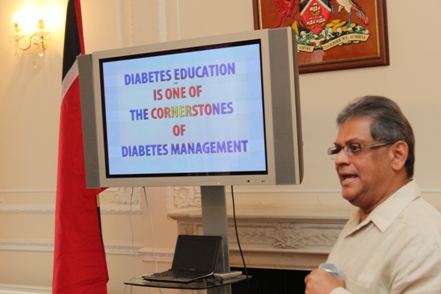
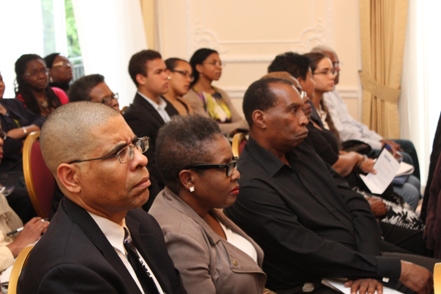
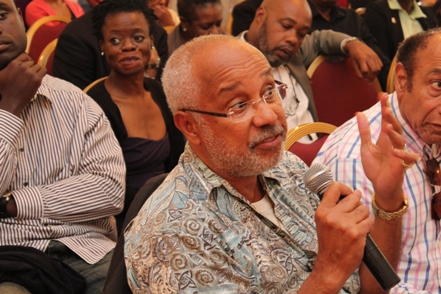

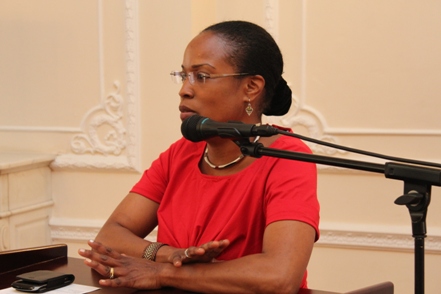

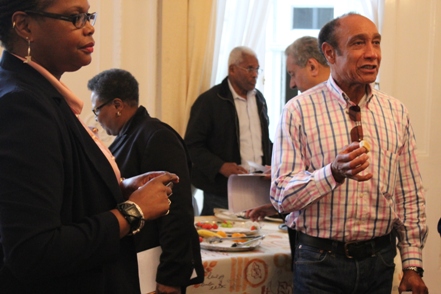
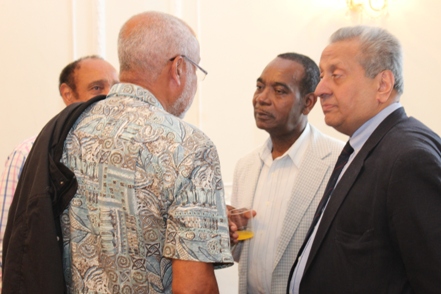

Add new comment